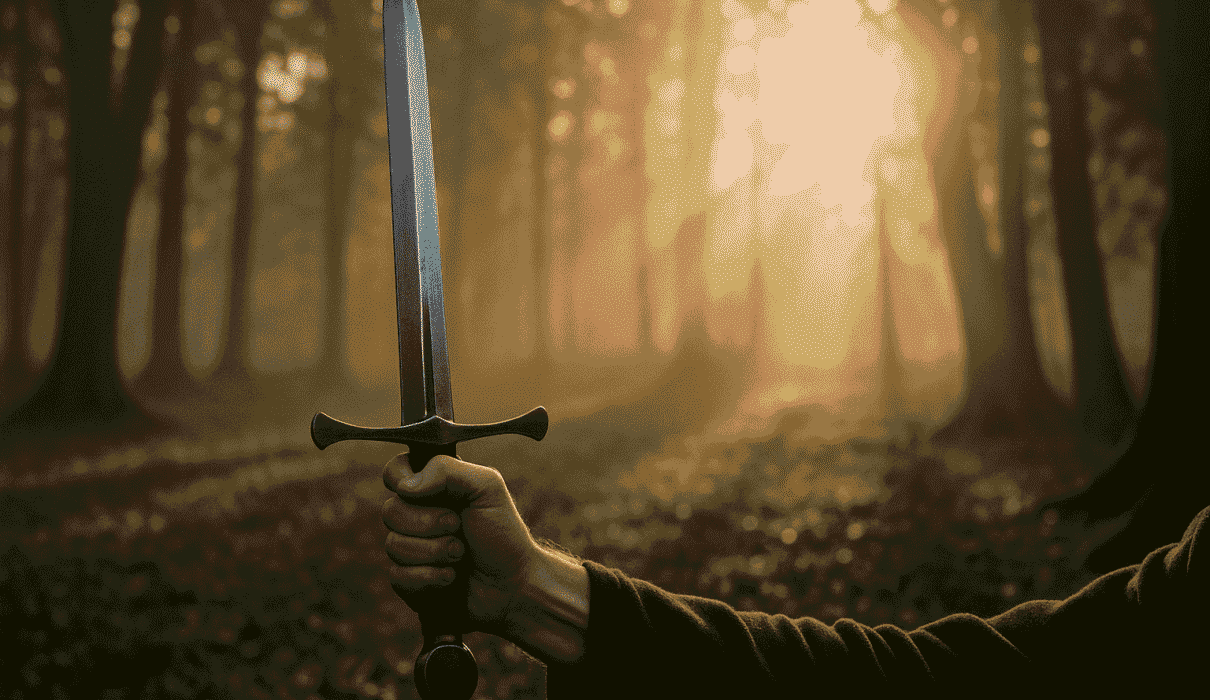Table of Contents
Today, people use guns and technology in war. But swords haven’t disappeared. Even though they’re not used in battle anymore, they still mean a lot. Swords are powerful symbols. They stand for honor, skill, history, and personal strength.
Let’s explore why swords still matter in our world today.
The sword is more than just a weapon. It’s a piece of history, honor, and pride.
Swords in Culture and History
Swords have been around for thousands of years. Knights in Europe, samurai in Japan, and warriors in many other places all used swords.
But swords were not just for fighting. They showed power, honor, and leadership. Kings and warriors wore them with pride.
Today, we still see swords in national flags, military uniforms, and important events. They are strong symbols that connect us to the past.
Swords in Martial Arts
In some martial arts, people still train with swords. For example:
- Kendo and Kenjutsu in Japan
- HEMA (Historical European Martial Arts) in the West
These martial arts are not just about fighting. They teach discipline, focus, and respect. Practicing with a sword helps people stay calm and think clearly. It’s like a workout for both body and mind.
Sword training helps students feel closer to the past and keeps old traditions alive.
Swords as Art and Craft
Making a sword takes a lot of time, skill, and care. In Japan, making a katana is considered a true art. Swordsmiths heat, fold, and shape steel with great precision.
Today, some people still make swords by hand. Their work is beautiful and valuable. Some people also collect swords because they admire the design and history.
These swords are not just weapons—they are works of art.
Swords in Movies, Games, and Books
Think of your favorite movies or games. Chances are, there’s a sword in them! Whether it’s The Lord of the Rings, Game of Thrones, Zelda, or The Witcher, swords play big roles.
Swords are perfect for heroes and warriors in fantasy and action stories. They make characters seem brave and noble.
Because of movies and games, many people get curious about real swords. They want to learn more about them, and some even start training or collecting.
Swords as Symbols of Personal Strength
We often use swords in everyday language. For example:
- “Double-edged sword” (something that has both good and bad sides)
- “Fall on your sword” (take the blame for something)
Swords also appear in tattoos, fashion, and even logos. People use them to show courage, strength, and transformation.
For some, a sword is more than just an image. It’s a way to show who they are and what they believe in.
Swords in Ceremonies and Rituals
Even today, swords are used in many important events.
- In the military, soldiers carry swords during parades and ceremonies.
- At weddings, some use a sword arch for a grand entrance.
- In religious or fraternal groups, swords are used in rituals.
- In military schools, the top student may receive a sword as a reward.
These moments show that swords still mean honor and respect.
Keeping Sword Traditions Alive
Many people want to protect the history of swords.
- Some join reenactment groups and act out historical battles.
- Others visit museums or collect old swords.
- Online, there are communities where people share sword knowledge and training videos.
Thanks to these groups, the story of the sword is still being told.
Why Swords Still Matter
Swords may no longer be used in modern battles. But they still play a big part in our culture and identity. They stand for discipline, honor, skill, and tradition.
In a fast-changing world, swords remind us of values that last forever.
References
- Dawson, T. (2007). Swords and Swordsmanship. Crowood Press.
- Friday, K. (2004). Legacies of the Sword: The Kashima-Shinryu and Samurai Martial Culture. University of Hawaii Press.
- Loades, M. (2010). Swords and Swordsmen. Pen and Sword Books.
- North, A. (2022). “Why the Sword Still Captivates Pop Culture.” Vox. https://www.vox.com
- Donohue, J. J. (1991). The Budo Encyclopedia: Martial Arts and Way of Life in Japan. Tuttle Publishing.
- Smithsonian Institution. (n.d.). “Swords and Blades from Around the World.” National Museum of American History. https://americanhistory.si.edu
- British Museum. (n.d.). “Historical Blades Collection.” The British Museum. https://britishmuseum.org
Faq’s
Why are swords still important today?
Swords are still important because they represent history, honor, discipline, and art. People use them in martial arts, ceremonies, and collections.
Do people still train with swords?
Yes, many people practice sword-based martial arts like kendo, kenjutsu, and historical European martial arts. These teach focus, respect, and self-control.
Are swords still made today?
Yes, modern swordsmiths and blacksmiths still make swords by hand. These are often used for martial arts, collecting, or display.
What do swords symbolize in movies and stories?
Swords often stand for bravery, justice, or heroism. They play a big role in fantasy, historical dramas, and action stories.
Can swords be considered art?
Absolutely. Handmade swords are often seen as artwork because of their detailed design, craftsmanship, and cultural value.
Why do people collect swords?
Many people collect swords to admire their beauty, history, and uniqueness. Some collect them as a hobby or to honor a specific culture or tradition.


